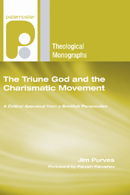Jim Purves: The Triune God and the Charismatic Movement
 Jim Purves, The Triune God and the Charismatic Movement: A Critical Appraisal of Trinitarian Theology and Charismatic Experience from a Scottish Perspective, Paternoster Theological Monographs (Cumbria, UK: Paternoster, 2004), 242 pages, ISBN 9781597527538.
Jim Purves, The Triune God and the Charismatic Movement: A Critical Appraisal of Trinitarian Theology and Charismatic Experience from a Scottish Perspective, Paternoster Theological Monographs (Cumbria, UK: Paternoster, 2004), 242 pages, ISBN 9781597527538.
Jim Purves has provided an important contribution not only to Charismatic studies but also to the specific field of Trinitarian theology. A word of caution, however, is in order: this work is not easily accessible to non-specialists. It is a publication of the author’s doctoral dissertation in systematic theology, and thus contains highly technical language and intricate distinctions among already complicated concepts in the history of theological reflection on the Trinity. In addition to this, Purves’ use of a degree of Scottish idiomatic language and coined conceptual phrases make for slow going if one wants to follow the argument carefully without missing anything. The difficulty is, however, relieved to an extent by Purves’ inclusion of a glossary of the more difficult terms (especially those that are original with him) in the back of the book.
Purves’ thesis is that Scottish theology, nurtured almost exclusively by the Reformed tradition, affords little Trinitarian or pneumatological (doctrine of the Holy Spirit) grounding to account for the direct experience of the Spirit had by participants in the Scottish Charismatic renewal. Reformed thought has primarily taken a functional view of the Holy Spirit, focusing on what the Holy Spirit does rather than who the Spirit is. Purves sees this as a fateful and false distinction based on the assumption of the Western view of the Spirit as the bond between the Father and the Son, which has notoriously depersonalized the Spirit in most of Western Christianity since the time of Augustine.
Purves spends the first chapter acquainting the reader with the history of the Charismatic renewal in the Scottish context, noting key figures and events, including tensions with the established Reformed churches. Chapter Two is devoted to an historical overview of the foundations of Trinitarian thought among the Patristics (Church Fathers). Purves notes that the earliest church theologians were primarily concerned with discussing the Trinity in terms of how the Triune God accomplishes our salvation. Historically, the Trinity as perceived in God’s relationship to the world in salvation history is designated the “economic Trinity.” Due to a spate of heresies that led to the great Christological conflicts of the fourth century, orthodox theologians came to focus much more on the “immanent Trinity,” how God exists within God’s own eternal triune self, apart from any considerations of God’s relationship to creation. In the West, with Augustine’s development of the Spirit as the bond of love between the Father and the Son, theology in general, and Trinitarian thought in particular, became much more rationalistic, as the Spirit’s role was seen as informing us of Christ, who in turn revealed the Father. The Spirit, while acknowledged as a Person, was nonetheless almost always discussed in non-personal, functional terms and the Spirit’s mission was virtually always subsumed under that of the Son.
Category: Church History, Spring 2007


